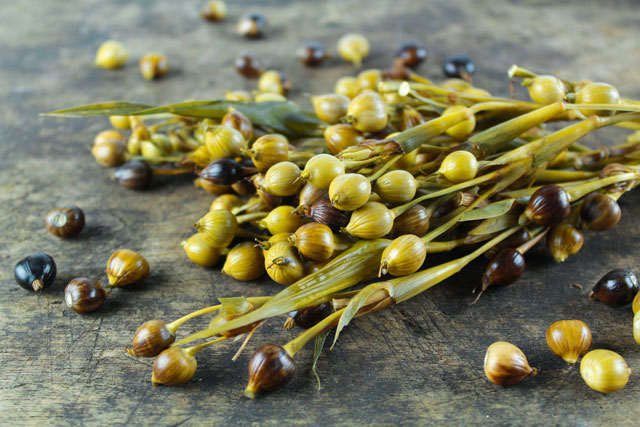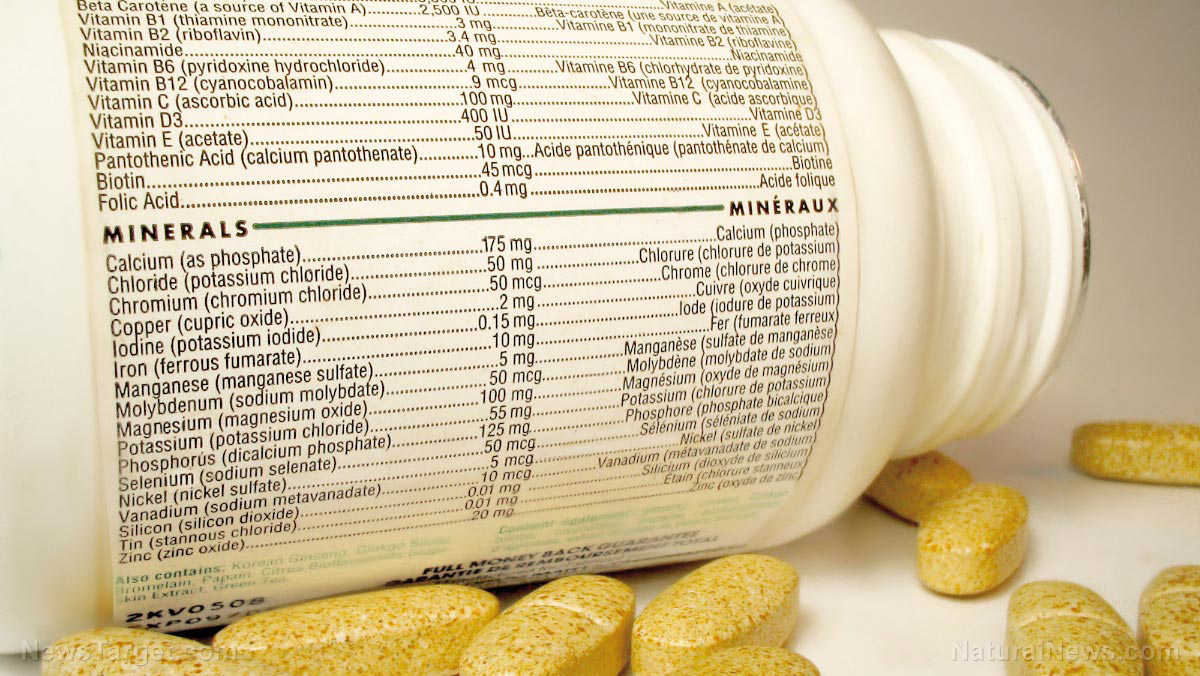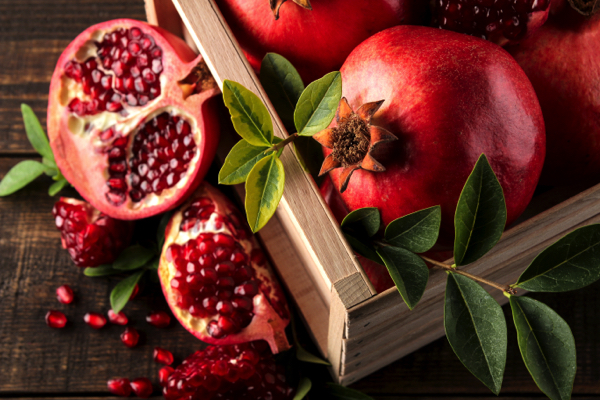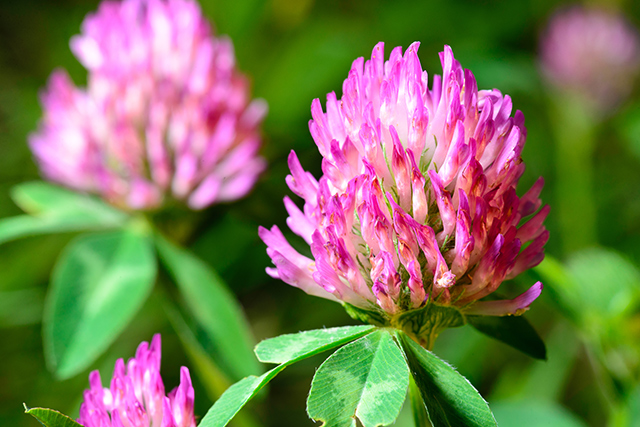Passionflower: From ancient symbol to modern natural remedy
04/10/2025 / By Ava Grace
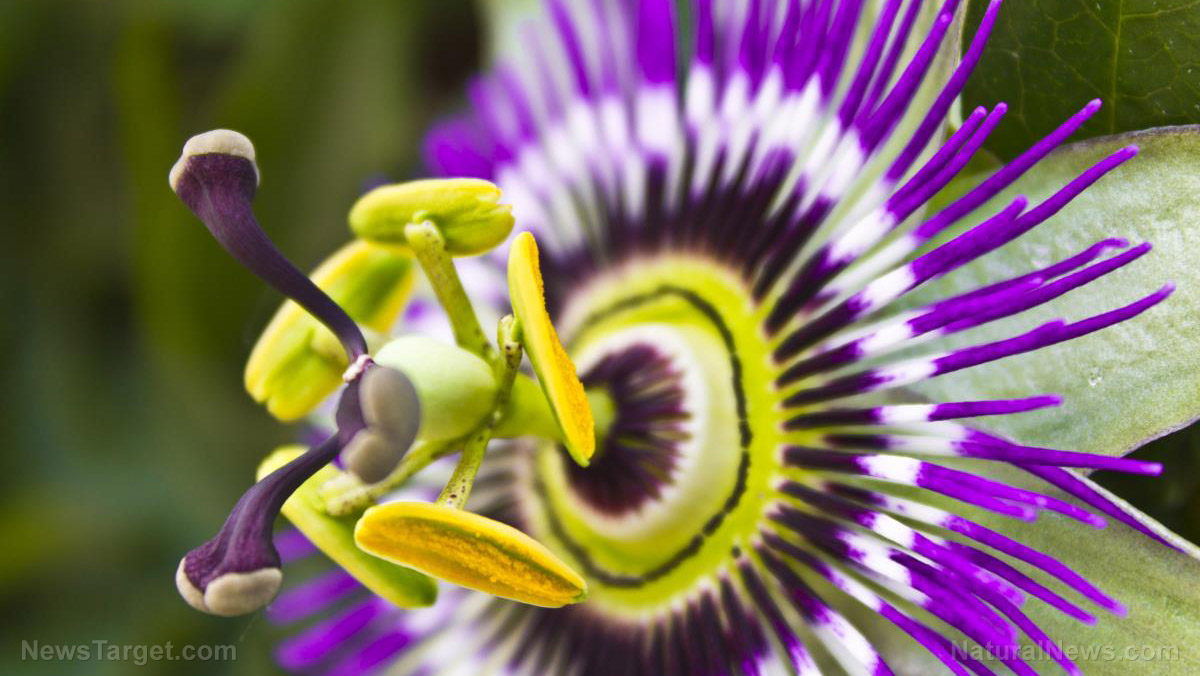
- Passionflower, scientifically named Passiflora incarnata, has a rich history rooted in the Americas. It has been used for centuries in traditional medicine and folklore.
- Passionflower contains bioactive compounds like flavonoids and alkaloids, offering antioxidant, anti-inflammatory and anxiolytic benefits. It is commonly used to alleviate anxiety, insomnia and stress-related disorders, as well as menopausal symptoms and inflammation.
- The plant is consumed as tea, tincture or capsules for its calming effects. Its fruit, known as “maypop,” is edible and has a tangy, tropical flavor, while its extracts are used topically to soothe skin or muscle tension.
- Passionflower’s fruit and leaves can be incorporated into recipes such as smoothie bowls, herbal teas, jams, infused honey and tropical salsas, adding both flavor and nutrition to meals.
- Passionflower is admired for its intricate, vibrant blooms and deeply lobed leaves. Beyond its beauty, it symbolizes wellness and resilience, offering a holistic approach to health and well-being.
Passionflower, scientifically known as Passiflora incarnata, is a botanical marvel that has captivated herbalists, gardeners and wellness enthusiasts for centuries. Known by a variety of evocative names — maypop, purple passionflower, true passionflower, wild apricot and wild passion vine — this fast-growing perennial vine is as enchanting as it is therapeutic. With its intricate, otherworldly blooms and rich history steeped in folklore and medicine, passionflower is more than just a pretty plant — it’s a powerhouse of healing potential.
Brief history of passionflower
The passionflower’s story begins in the Americas, where it was first discovered by Spanish explorers in the 16th century. The plant’s name, Passiflora, derives from the Latin word passio, meaning suffering, and flos, meaning “flower.” Early missionaries saw the flower’s intricate structure as a symbol of the Passion of Christ, with its ten petals representing the ten apostles present at the crucifixion, its radial filaments symbolizing the crown of thorns, and its three stigmas representing the nails used in the crucifixion. (Related: Passion flower is effective for countering anxiety and stress.)
Native to the southeastern United States, Central America and parts of South America, passionflower thrives in warm, temperate climates. It has since been cultivated worldwide, particularly in Europe and Asia, where it is valued for its medicinal properties and ornamental beauty.
One of the most intriguing aspects of passionflower is its nickname, “maypop.” This name refers to the plant’s fruit, which produces a popping sound when stepped on. In the southeastern United States, children would playfully stomp on the fruit, delighting in the unexpected noise. Beyond this playful side, the maypop fruit is edible and has a tangy, tropical flavor reminiscent of guava or apricot.
Phytonutrients and medicinal uses
Passionflower is rich in phytonutrients, including flavonoids (such as vitexin, isovitexin and chrysin), alkaloids (like harman and harmine) and phenolic compounds. These bioactive compounds contribute to its antioxidant, anti-inflammatory and anxiolytic properties. Research suggests that passionflower may help modulate the nervous system, making it a popular natural remedy for anxiety, insomnia and stress-related disorders.
Passionflower has been traditionally used to address a wide range of ailments. Its calming effects make it a natural choice for managing anxiety and promoting restful sleep. Studies have shown that passionflower can reduce symptoms of generalized anxiety disorder (GAD) and improve sleep quality without the grogginess often associated with pharmaceutical sedatives.
Additionally, passionflower has been explored for its potential to alleviate symptoms of menopause like hot flashes and mood swings, due to its mild estrogenic activity. Its anti-inflammatory properties may also benefit individuals with conditions like arthritis or gastrointestinal inflammation.
Passionflower is most commonly consumed as tea, tincture or capsules. Dried passionflower leaves, stems and flowers can be steeped in hot water to create a mild, slightly earthy tea with a subtle floral aroma. Tinctures, made by extracting the plant’s active compounds using alcohol or glycerin, are often used for their concentrated effects. Passionflower is also found in herbal blends designed to promote relaxation and sleep. Topically, passionflower extracts can be incorporated into creams or oils to soothe skin irritations or muscle tension.
Culinary uses and recipes
Passionflower’s appearance is nothing short of mesmerizing. Its large, intricate flowers feature a striking combination of purple and white petals, with a central corona of filament-like structures that range in color from deep purple to pale lavender. The plant’s leaves are deeply lobed, and its fruit, the maypop, is oval-shaped and green when unripe, turning yellow-orange as it matures.
The taste of passionflower tea is mild and slightly floral, with a hint of earthiness. The fruit, when ripe, offers a tangy, sweet flavor that can be enjoyed fresh or used in culinary creations.
Passionflower’s fruit and leaves can be incorporated into a variety of recipes, providing both flavor and nutrition. Here are a few recipe ideas to try:
- Maypop smoothie bowl – Blend ripe maypop fruit with bananas, spinach and almond milk for a refreshing and nutrient-packed breakfast.
- Passionflower herbal tea – Combine dried passionflower leaves with chamomile and lavender for a calming bedtime brew.
- Maypop jam – Cook the fruit with honey and lemon juice to create a tangy, tropical spread for toast or pastries.
- Passionflower-infused honey – Steep passionflower leaves in warm honey for a soothing sweetener to add to teas or desserts.
- Tropical maypop salsa – Dice maypop fruit and mix with tomatoes, onions, cilantro and lime juice for a unique twist on salsa.
Passionflower, with its rich history, stunning beauty and impressive therapeutic properties, is a true gift from nature. Whether enjoyed as a calming tea, a flavorful fruit or a natural remedy for anxiety and insomnia, this versatile plant continues to inspire and heal. As modern science delves deeper into its potential, passionflower remains a timeless symbol of wellness and resilience.
This story is not medical advice and is not intended to treat or cure any disease. Always consult with a qualified naturopathic physician for personalized advice about your specific health situation or concern.
For more fascinating insights into superfoods and their natural wonders, visit NaturalNews.com. It’s a treasure trove of articles that will deepen your understanding of the healing power of food.
If you’re into cutting-edge technology with a health twist, try Brighteon.ai. Created by Mike Adams, the Health Ranger, this AI model is a free download that you can run on your own device. It’s all about sharing knowledge freely and bypassing the filters of censorship.
And if you’re looking for a place to openly discuss everything from nutrition to natural remedies without any holds barred, Brighteon.com is your go-to spot. Don’t forget to check out their free speech social media platforms, Brighteon.IO and Brighteon.social, where the conversation is always lively and uncensored.
Watch this video to learn more about the many benefits of passionflower.
This video is from the Holistic Herbalist channel on Brighteon.com.
More related stories:
Passionflowers aren’t just pretty ornamentals, they’re also cancer busters.
Passionflower can reduce anxiety in just 30 minutes.
8 Tips to help you manage anxiety naturally plus herbal tea recipes for anxiety relief.
The winged-stem passionflower can selectively kill cancer cells, says study.
A natural remedy for neuropathic pain: Purple passionflower.
Sources include:
Submit a correction >>
Tagged Under:
alternative medicine, anxiety relief, beat depression, health science, herbal medicine, Herbs, maypop, mental health, Mind, natural cures, natural health, natural ingredients, natural medicine, Naturopathy, organics, passionflower, plant medicine, remedies, sleep, stress relief
This article may contain statements that reflect the opinion of the author


